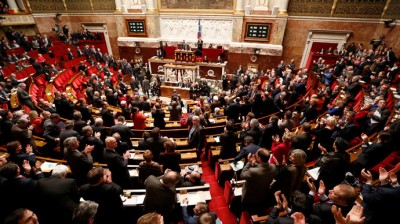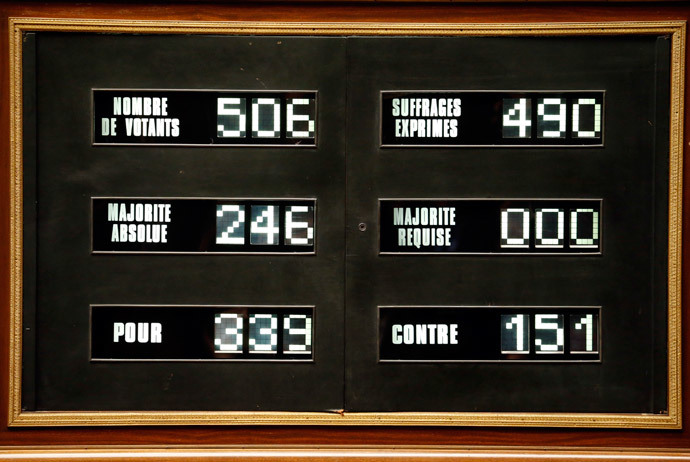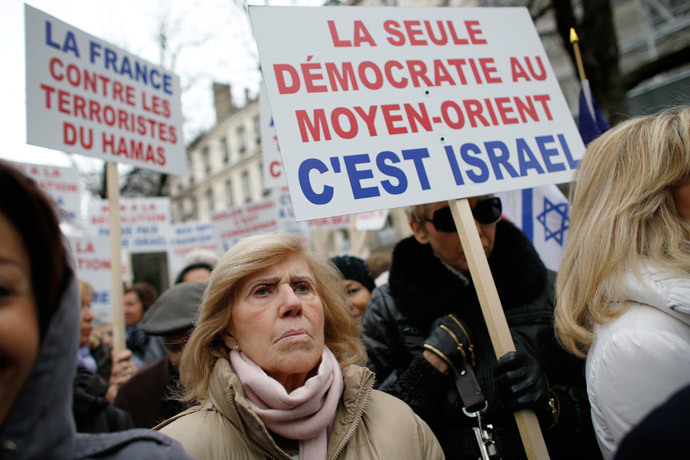French Parliament Votes to Recognize Palestinian State

Image: General view of the hemicycle as deputies applaud after the results of the vote on Palestine status at the National Assembly in Paris December 2, 2014. (Reuters / Charles Platiau)
France’s Socialist-led parliament has passed a symbolic vote to recognize Palestinian statehood, despite staunch objections from Israel. MPs in Britain and Spain have already passed similar motions.
The proposal was passed with 339 votes in favor and 151 against, meaning that it was supported by more than two-thirds of French lawmakers.
Israel immediately responded, saying that the motion would “harm the peace process,” AFP reported.
Image: View of an electronic voting results board in the hemicycle after the vote on Palestine status at the National Assembly in Paris December 2, 2014. (Reuters / Charles Platiau)
The vote is non-binding, but sends a signal that Israelis and Palestinians must return to the negotiating table, following the collapse of US-mediated statehood talks in April.
“We don’t want a symbolic recognition that will only lead to a virtual state. We want a Palestinian state that is real so we want to give a chance to negotiations,” Europe Minister Harlem Desir told lawmakers after the votes were tallied.
Foreign Minister Laurent Fabius has supported the vote, setting a two-year deadline for the creation of an independent Palestine. He said that if no resolution had been found by then, France would officially recognize Palestine anyway.
Image: People gather to protest against the vote by French lawmakers of a symbolic non-binding motion to recognise Palestine on December 2, 2014 in front of the French National Assembly in Paris. (AFP Photo / Thomas Samson)
So far, Sweden has been the only country to diplomatically accept the existence of Palestine, despite similar symbolic votes across Europe.
But not everybody accepted Tuesday’s motion as a “gesture of peace and friendship,” as it was described by its supporters.
“It will add fuel to the fire in a region that doesn’t need that at all,” said Christian Jacob, leader of the conservative UMP Party, which voted against the initiative.
Image: Christian Jacob (AFP Photo / Miguel Medina)
Outside the parliament building, several hundred Jewish demonstrators gathered in protest, bearing placards reading: “Hamas + Fatah = Terrorist state.”
Israeli officials have said that Europe’s drive to legitimize Palestine is a validation of Hamas’s rocket attacks on settlements inside Israel, and disincentivizes Palestinians from making any further concessions during future talks.
April’s negotiations stalled after the Palestinians refused to abandon their commitment to the “right of return,” a condition that means potentially millions of Arabs from nearby regions would be entitled to Israeli citizenship.
In turn, Jerusalem is failing to budge on Jewish settlements in the West Bank, and insisting that IDF troops should be stationed permanently in the area, even after the creation of an independent Palestine.
The situation has been further inflamed by Israel’s incursion into Gaza this summer, in which over 2,100 Palestinians and more than 60 Israelis died.




